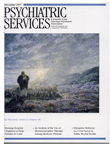Characteristics of Persons With Mental Illness in a Representative Payee Program
Abstract
This study compared the characteristics of 56 clients with severe mental illness in a community mental health agency's representative payeeship program with those of 54 clients who did not participate in the program. Based on data from a two-year period, participants in the representative payee program were characterized by disability or financial distress, indicated by a diagnosis of schizophrenia, homelessness, lack of rent money, and lack of financial skills; long-term dependence on income from Social Security and services provided by the mental health system, evidenced by receipt of Supplemental Security Income and frequent hospitalizations; and lack of financial independence, as reflected by inability to earn income from employment and lack of financial support from family.



